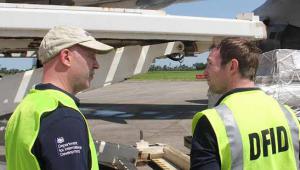By Judith Ugwumadu | 07 March 2013
The Department for International Development must focus its aid programme in Afghanistan on poverty reduction, the aid watchdog said after it found some projects designed to strengthen economic activity were performing poorly.
As such, the Independent Commission for Aid Impact rated DFID’s bilateral growth and livelihoods projects in Afghanistan ‘amber/red’, meaning the programmes were performing ‘relatively poorly’ and ‘significant improvements’ should be made. The projects accounted for around 30% of DFID’s £190m annual aid budget in Afghanistan.
Of the five programmes examined, ICAI said: ‘We found mixed results... The more ambitious and multi-faceted projects were less successful than those with more limited scope. Our fieldwork provides evidence that a positive difference is being made to the livelihoods of intended beneficiaries in the areas we surveyed. It is not clear, however, how positive impacts will, in all cases, be sustained in the long term.’
ICAI highlighted areas such as poppy cultivation, which was ‘delivered well’, but showed ‘no evidence of long-term sustainable change’, as a result of the £19.3m rural development programme. The watchdog said ‘no poverty data’ was made available despite there being an increase in harvest in the Helmand region of Afghanistan. As a result, using evidence-based interventions DFID has been given six months to ‘formally review current and future projects to focus on its portfolio more firmly on reducing poverty’.
Graham Ward, ICAI chief commissioner, said: ‘DFID faces challenges to ensure that its future growth and livelihoods portfolio is sufficiently coherent and flexible, given an increasingly uncertain future. The on-going international military drawdown is an important opportunity for DFID to focus its future strategy solely on poverty reduction and to reposition itself as the lead operator of the UK’s presence in Afghanistan.’
The watchdog also urged DFID to ensure that intended beneficiaries are directly consulted when new projects are being designed and to enhance its approach and commitment to independent monitoring.
ICAI’s lead commissioner Mark Foster added: ‘Once international military forces have left Afghanistan, by the end of 2014, meeting the humanitarian and development needs of the poor is likely to become even more difficult.
‘It is vital, therefore, that DFID selects the right mix of projects for this context – projects that focus on the needs of intended beneficiaries and that are based on sound evidence.’
In response, a DFID spokesman said the department’s post-2014 planning would take all ICAI’s recommendation into account and their staff continue to work hard to deliver projects in an ‘incredibly difficult’ environment.
‘Despite this, over the last 12 years, DFID has made real difference to the lives of millions,’ he added. ‘ICAI’s report acknowledges that we work effectively with delivery partners, that several projects are exceeding their targets and that our livelihoods programmes are delivering significant improvements to thousands of people.
‘Our vision is a more peaceful, stable, viable and prosperous Afghanistan. This is in everyone’s interest, and our programmes are helping to achieve this vision.’












